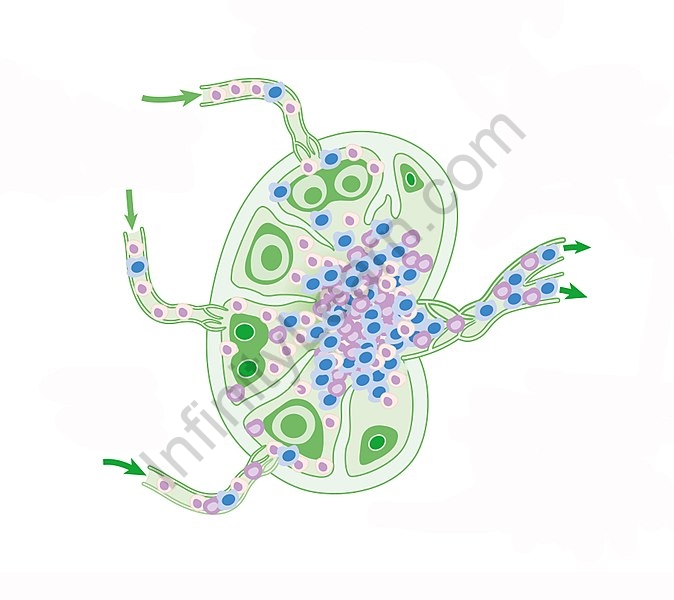Table of Contents

Introduction
Lymph is a colourless fluid that circulates throughout the lymphatic system. The main role of the lymphatic system acts as a filter against bacteria, organic waste, toxins and other wastes. It carries lymphocytes throughout the body to fight infections.
In animals and humans, the fluid outside the cell (the fluid outside the cell) is divided into a fluid (a fluid located between tissues) and plasma. It contains small solvents in water that flows between tissue cells. Both plasma and interstitial fluid are the same due to the continuous exchange of small solvents, water and ions in all capillary walls of tissues.
The functions of interstitial fluid are as follows:
It is used to transport nutrients to cells.
- Allows interaction between cells.
- It removes metabolic waste from cells.
- The interstitial fluid is collected by the lymphatic system and another is excreted. Enlightened fluid returns to the bloodstream and the remaining fluid is collected in the lymph capillaries, also known as lymphatic capillaries.
Let us analyze the formation and function of lymph in humans.
Lymph formation
The lymphatic system includes lymph plasma, lymph corpuscles and lymphoid organs. Lymph formation is described below:
- Lymph Plasma
Lymph is interstitial fluid. It contains the same mineral content as plasma. It contains less calcium, fewer blood proteins, less phosphorus, and higher glucose concentration. Globulin proteins are real antibodies found in lymph plasma. Some substances include living and non-living things. The exchange of nutrients and gases between blood and tissue cells occurs through the lymph.
- Lymph Corpuscles
These include leukocytes and amoeboid cells. It contains specialized lymphocytes that are involved in finding immune responses in the human body.
- Lymphoid organs
The lymphatic system contains many lymph nodes within the body. These lymph nodes are connected to the lymphatic arteries that circulate lymph throughout the body. Lymph is filtered out to the lymph nodes.
The spleen, tonsils, adenoids and thymus all form part of the lymphatic system. The spleen is considered to be the largest lymphatic organ in the system, located below the ribcage, above the abdomen, and exactly along the upper left quadrant of the abdomen. Other parts of the lymphatic system – tonsils, adenoids and thymus are found on both sides of the throat and neck.
Lymph is a fluid that flows through the lymphatic system, a system made up of lymph nodes and lymph nodes that interfere with their function, such as the venous system, to return fluid from the tissues to the central circulation.
Other Parts of the Lymph in People
- Carbohydrates
- Lymphocytes
- Creatinine
- Water – 94%
- Urea
- Chlorides
- Enzymes
- Proteins – albumin, globulin, and fibrinogen
- Non-protein nitrogenous substances
Lymph function
The lymph performs many important functions. A few major lymph functions are listed below:
- It keeps the body’s cells moist.
- It carries oxygen, hormones and nutrients to different parts of the body and removes metabolic waste from cells.
- It carries antibodies and lymphocytes into the bloodstream.
- Maintaining the formation of tissue fluid and blood volume.
- Absorption of fat from the small intestine occurs through lymphatic vessels.
- It prevents the invasion of germs and foreign substances into the lymph nodes.
FAQ’s
What are the 3 lymphatic organs?
Lymphatic organs include the spleen, thymus and tonsils.
How do you know if your lymphatic system is blocked?
Symptoms of a blocked lymphatic system include inflammation, fatigue, constipation, depression, and obesity.
What is the function of the lymphatic system?
The function of the lymphatic system is to carry lymph throughout the body containing white blood cells that fight infection.





